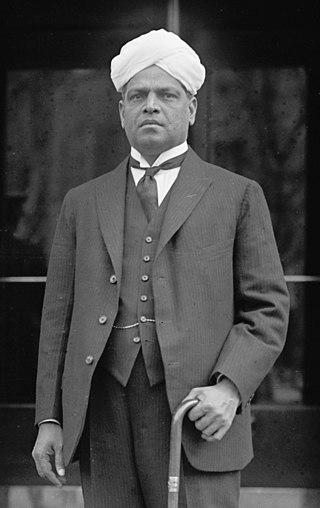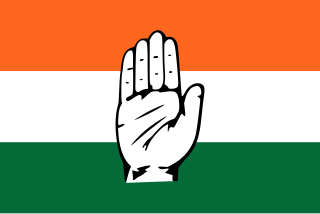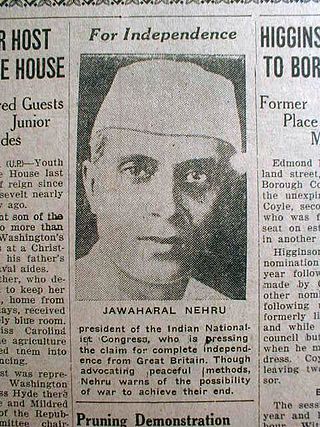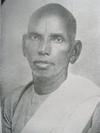Related Research Articles

Jawaharlal Nehru was an Indian anti-colonial nationalist, statesman, secular humanist, social democrat, and author who was a central figure in India during the middle of the 20th century. Nehru was a principal leader of the Indian nationalist movement in the 1930s and 1940s. Upon India's independence in 1947, he served as the country's first prime minister for 16 years. Nehru promoted parliamentary democracy, secularism, and science and technology during the 1950s, powerfully influencing India's arc as a modern nation. In international affairs, he steered India clear of the two blocs of the Cold War. A well-regarded author, his books written in prison, such as Letters from a Father to His Daughter (1929), An Autobiography (1936) and The Discovery of India (1946), have been read around the world.

Gopal Krishna Gokhale was an Indian political leader and a social reformer during the Indian independence movement and political mentor of Indian freedom fighter Mahatma Gandhi.

Annie Besant was a British socialist, theosophist, freemason, women's rights and Home Rule activist, educationist, and campaigner for Indian nationalism. She was an ardent supporter of both Irish and Indian self-rule. She became the first female president of the Indian National Congress in 1917.

Bhagwan Das was an Indian Theosophist and public figure. For a time he served in the Central Legislative Assembly of British India. He became allied with the Hindustani Culture Society and was active in opposing rioting as a form of protest. As an advocate for national freedom from the British rule, he was often in danger of reprisals from the Colonial government. He was awarded the Bharat Ratna in 1955.

The non-cooperation movement was a political campaign launched on September 4, 1920, by Mahatma Gandhi to have Indians revoke their cooperation from the British government, with the aim of persuading them to grant self-governance.

Motilal Nehru was an Indian lawyer, activist, and politician affiliated with the Indian National Congress. He served as the Congress President twice, from 1919 to 1920 and from 1928 to 1929. He was a patriarch of the Nehru-Gandhi family and the father of Jawaharlal Nehru, India's first Prime Minister.

Kamala Nehru was an Indian independence activist and the wife of Jawaharlal Nehru, the first prime minister of India. Their daughter Indira Gandhi was the first female prime minister of India.

The Indian Home Rule movement was a movement in British India on the lines of the Irish Home Rule movement and other home rule movements. The movement lasted around two years between 1916–1918 and is believed to have set the stage for the independence movement under the leadership of Annie Besant and Bal Gangadhar Tilak to the educated English speaking upper class Indians. In 1920 All India Home Rule League changed its name to Swarajya Sabha.

Valangaiman Sankaranarayana Srinivasa Sastri was an Indian politician, administrator, educator, orator and Indian independence activist. He was acclaimed for his oratory and command over the English language. Srinivasa Sastri was born to a poor temple priest in the village of Valangaiman near Kumbakonam, India. He completed his education at Kumbakonam and worked as a school teacher and later, headmaster in Triplicane, Madras. He entered politics in 1905 when he joined the Servants of India Society. Sastri served as a member of the Indian National Congress from 1908 to 1922, but later resigned in protest against the Non-Cooperation movement. Sastri was one of the founding members of the Indian Liberal Party. In his later days, he was strongly opposed to the partition of India.
Mahavir Tyagi was a prominent Indian independence fighter and parliamentarian from Dehra Dun, Uttar Pradesh India.

The Indian National Congress was established when 72 representatives from all over the country met at Bombay in 1885. Prominent delegates included Dadabhai Naoroji, Surendranath Banerjee, Badruddin Tyabji, Pherozeshah Mehta, W. C. Bonnerjee, S. Ramaswami Mudaliar, S. Subramania Iyer, and Romesh Chunder Dutt. The Englishman Allan Octavian Hume, a former British civil servant, was one of the founding members of the Indian National Congress.

Muthulakshmi Reddy was an Indian medical practitioner, social reformer and Padma Bhushan award recipient.

The Declaration of Purna Swaraj was a resolution which was passed in 1930 because of the dissatisfaction among the Indian masses regarding the British offer of Dominion status to India. The word Purna Swaraj was derived from Sanskrit पूर्ण (Pūrṇa) 'Complete', and स्वराज (Svarāja) 'Self-rule or Sovereignty', or Declaration of the Independence of India, it was promulgated by the Indian National Congress, resolving the Congress and Indian nationalists to fight for Purna Swaraj, or complete self-rule/total independence from the British rule

Pupul Jayakar was an Indian cultural activist and writer, best known for her work on the revival of traditional and village arts, handlooms, and handicrafts in post-independence India. According to The New York Times, she was known as "India's 'czarina of culture'", and founded arts festivals that promoted Indian arts in France, Japan, and the United States. She was a friend and biographer to both the Nehru-Gandhi family and J Krishnamurti. Jayakar had a close relationship with three prime ministers: Jawaharlal Nehru, his daughter Indira Gandhi and her son Rajiv Gandhi, and she was a close friend of Indira Gandhi. She served as cultural adviser to the latter two, confirming her preeminence in cultural matters.

Shiv Prasad Gupta was a visionary, philanthropist, a leader of the Indian Freedom Movement and the founder of the Mahatma Gandhi Kashi Vidyapeeth. Though belonging to a very wealthy industrialist and "Jamindar" family, he devoted his entire life to actively participate, assist and give financial aid to the various movements of the freedom struggle. He was a close associate and friend of Mahatma Gandhi, Pandit Jawaharlal Nehru, Bal Gangadhar Tilak, Mahamana Madan Mohan Malviya and all the other nationalist leaders, who often stayed with him on their visit to Varanasi and relied upon his advice and support.

Madhav Shrihari Aney ; popularly referred to as Loknayak Bapuji Aney or Bapuji Aney, was an ardent educationist, freedom fighter, statesman, a modern Sanskrit poet and a politician. He was also conferred with the title of "Loknayak Bapuji", which means "The People's Leader and Respected Father". He was one of the founders of the Congress Nationalist Party. He was first among the eminent disciples of Lokmanya Tilak such as N C Kelkar, Kakasaheb Khadilkar, Gangadhar Deshpande, Dr B S Munje, Abhyankar, T B Paranjpe and Vaman Malhar Joshi, who walked in the footsteps of Tilak. Accepting the leadership of Mahatma Gandhi on the death of Bal Gangadhar Tilak. Aney persuaded his colleagues to see the writing on the wall. At the same time he was not blind in his loyalty. He disapproved Congress throwing itself in Khilafat Movement and warned against excessive wooing of Muslims at the cost of national interests. He regarded unity at any price as elusive and dangerous. Since the best safeguard for the minority was the goodwill of the majority. He never permitted his critical faculties to be blurred by emotion. Mahatma Gandhi admiring his calm logic, confided in him and often sought his counsel. He was chosen to arbitrate the disputes between Subhash Chandra Bose and Jatindra Mohan Sengupta. He was never a breaker or a destroyer but was always a cementing factor believing in synthesis and not in segregation.

Konda Venkatappayya or Konda Venkatappaiah B.L. (1866–1948) was a noted Indian lawyer, freedom fighter, and politician from what is now Andhra Pradesh. He was one of the founders and the first editor of Krishna Patrika, a leading weekly Telugu magazine during the early 20th century.
The Responsive Cooperation Party was a political party operating in the Indian independence movement and was established by M. R. Jayakar, B. S. Moonje, N. C. Kelkar and others. The party was a splinter from the Motilal Nehru-led Swaraj Party, which was further split by the formation of the Independent Congress Party and the Nationalist Party. The Responsive Cooperationists had become opposed to the concept of non-cooperation with the government of the British Raj and Jayakar's move away from the Swaraj Party was evident by October 1925. The concept of responsive cooperation predates the party and was coined by Joseph Baptista, before being taken up by Bal Gangadhar Tilak, of whom Kelkar was a follower, around 1919.
Lokagrani Adv. Balwantrao Ragav alias Balasaheb Deshmukh was one of the political leaders who become famous not only in Chandrapur but also in whole vidharbha by his imbibed qualities and devotion. He was a prominent leader of Tilak era.

Syed Hossain was a undivided Indian journalist, an Indian independence activist, and the first Indian ambassador to Egypt in the Jawaharlal Nehru administration.
References
- ↑ Dasa, Jinaraja (2 February 1996). A Short Biography of Annie Besant. Adyar: T.P.H.
- ↑ "Annie Besant". www.inc.in. Indian National Congress - official website. Retrieved 29 October 2018.
- ↑ Nehru, Jawaharlal (1 March 1945). An Autobiography (1 ed.). Calcutta: Bodell.
- ↑ "Annie Besant (1847 - 1933)". www.ts-adyar.org. Theosophical Society Adyar. Retrieved 29 October 2018.
- ↑ Ram, N.Sri (2 October 2002). "'Dr Annie Besant's Work for Education in India'". The Theosophist. 124 (1).
- ↑ "Remembering Annie Besant: The woman who started Home Rule League". India Today. 1 October 2016. Retrieved 29 October 2018.
- ↑ Besant, Annie (1 May 1999). Annie Besant, An Autobiography (5 ed.). Adyar: TPH.